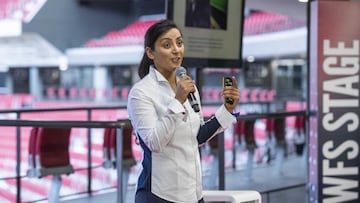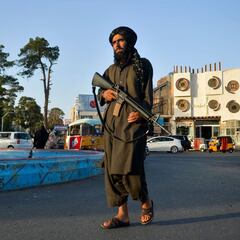Khalida Popal interview: "The Taliban is a nightmare becoming reality"
Khalida Popal, founder and former captain of the Afghanistan women’s national soccer team, spoke to this newspaper about the situation in her country.


As a young girl, Khalida Popal, used to beg the families of her friends to allow them to play football with her in an isolated yard in her home city of Kabul in Afghanistan. She got enough of them to join her, that they eventually moved to public fields, where, despite taunts, abuse and even stone-throwing from those who disapproved, they formed a movement that would end up with Popal founding the Afghanistan Women’s National Football team in 2007.
The athlete however was forced to flee the country in 2011 after receiving death threats. She went to India before claiming and receiving asylum in Denmark, where she now lives, and where she founded Girl Power, an organisation that looks to empower women in minority communities in Europe by using sport to give them the chance to meet others like them and develop greater self-esteem and confidence.

Popal is in Madrid, where she gave a talk on Thursday morning at the World Football Summit about her story, as well as recent events in Afghanistan, where the Taliban retook control in August, likely putting an an end to women’s sport in the country for the foreseeable future.
For the young Khalida growing up in Afghanistan, who were your role models, and your inspirations, who did you look up to and what prompted you to get into football?
I have had so many role models in my life and if I had to name one person, that would have to be my grandfather. He was something of a mentor to me and indeed a bit of a feminist. He was a person who believed in equality, who insisted on my education and the value of learning… he also taught me to be independent as a person and not be dependent on men. My mother too was another inspiration and she was very loving. She was a physical education teacher and was instrumental in those times when I would try and get parents to let their daughters play football. I needed an adult with me to help encourage other parents to let the girls play.
What drives a young girl growing up in Afghanistan to play soccer or football. What was the motivation that drove you towards football?
In the beginning when I wanted to play, my motivation was to defy those who told me time after time that women should not play sport, that my place was at home working in the kitchen. This was the view in the Afghan society. I soon realised that sport could provide a source of empowerment for women and it became a challenge for me to use football to empower women and girls in my society and our country. I was privileged, I had a family behind me and counted on their support. At no time did my family make me feel like a second class citizen and I always had the same opportunities as my brothers at home. Having said that, every time I would step out of this ‘comfort zone’ I could see that my situation was so, so different to that of many other girls. That’s what provided my motivation. I wanted to use my influence and passion for the game to help others.
When you were growing up, there wasn't the same amount of coverage for women's soccer, there was no Megan Rapinoe, Christien Press or Pernille Harder to inspire young girls. What players did you want to emulate at the time?
Watching the World Cup in Afghanistan was always a massive event and football is easily the most popular sport in the country. But my early memories of watching football are all of the men’s game. I could never say to my brother, “Look, women can play too as there was no exposure”.
I do remember growing up loving Brazil, the country, the culture and the national team too. I loved Ronaldinho and remember having a massive poster of him on my bedroom wall. I also loved Ronaldo and remember discovering Marta (Viera da Silva) who was my first female football hero. I’ve followed her career and would always look for interviews with her via FIFA but would be frustrated as they were all in Portuguese at the time. She’s a born fighter and has set an amazing example to girls all around the world.
Today, there is far more visibility and interest in the women’s game which is fantastic, because the younger generation will not struggle to find role models. They send a powerful message and show what women can do and how well they can play football. This is so important for girls in certain parts of the world where they are told that football is a man’s game and it’s important that these cultures change that mindset.
You were instrumental in forming the women's national team in Afghanistan. How did that come about?
It started through creating a league structure for women’s football by encouraging young girls to play with local teams. We met with fierce resistance from brothers and fathers who felt we were corrupting these girls but we didn't give up. We went from door to door at times and had to beg for permission from dads and brothers to let the girls play and eventually a league was formed.
And this all happened at a time when the Taliban were not ruling in Afghanistan?
I'm talking about from 2002 to 2007 when we started, we carried out a series of campaigns and got the likes of physical education teachers on board and we tried to get them to play football at the schools and then have inter-school tournaments and competitions. We went to so many schools and when we had plenty of girls playing the game, we approached the Afghan Football Association and explained what we had done and said you need to support is and that initially was a major obstacle. They felt we would be a source of embarrassment along with the usual issues of women playing football but we refused to give up
Were they worried about failure as a team or was it just the idea not accepting a national women’s team?
It was both things. They were worried about failure on the pitch but also even having a women’s team. We kept pushing and explained the possibility of generating added revenue from a women’s team and we didn't give up. We explained that they [the FA] would get global recognition and this in turn would bring in additional money…we said “we will work for you and you will get the credit, money and all the benefit. Eventually they consented and the women’s national team was created.
🗣️ "I’m going to use my voice and use media to tell the story of why I’m worried about what is happening [in Afghanistan]. I need help for my girls."
— World Football Summit (@WFSummit) September 23, 2021
- @khalida_popal
🤝 #WFSEurope 🌐 pic.twitter.com/JxZnweKg4l
What was the initial reaction to this? How did the average Afghan take to this groundbreaking initiative?
Things initially were very low-key and at times we had to train on terrible surfaces despite having selected the best players from every club from the team. We played our first game at an invitation tournament in Pakistan. It was a non FIFA recognised game and there was no media attention. At the time we had no relationship with or even talk to the media.
Was this the game against Nepal?
No, that was the first official game, this was a friendly in Pakistan back in 2007, we played as a guest team and won a trophy even though it was not recognised. This competition, however generated a considerable amount of recognition afterwards and this prompted a degree of attention and visibility with the media in Afghanistan. All of a sudden people started to know about us and we started to generate media interest with requests for interviews with the team.
What prompted the death threats that meant you had to leave the country in 2011?
Apart from my work with football, I was also an activist, that’s the way I am. I believe in standing up for my rights as a human being and I stand for the rights of other women. I’ve seen girls with their rights taken away from them and I cannot keep quiet. Me raising my voice has been for some a threat as it challenges the people who are in power and this can be a problem in a country like Afghanistan, where many, especially women, don't really have freedoms or a voice.
Did you have freedom at that time, even though it wasn't under the Taliban regime?
The Taliban has always been there, at that time they were maybe in the background. Basically I was speaking out against the Taliban ideology, and there were many people who supported their way of thinking. Afghanistan you have to remember was a closed country when they were in power and there is a generation of people who had become brainwashed. Under their rule people were even not allowed to watch TV, listen to music, or follow any media channels. Girls couldn’t go to schools and the only education available was a Taliban education. Women were not seen in that society and then when power shifted in the bulk of Afghan cities, for many men it was too much to see women enjoying new freedoms, such as being allowed to be seen in public without the full burka.
What was the culture like?
There was a culture of fear, a fear of change with many men worried that if women were to become empowered then they would lose control and power. Activists like myself faced so many face challenges, I was lucky. I was lucky to get out alive but so many female activists disappeared.
So you moved to Denmark, and continued to coach football and carry on your activism. This summer must have been traumatic when you saw the Taliban regime return. How difficult have the past weeks been?
It’s been difficult. Despite leaving the country, I never stopped supporting women’s football in my country and have always been involved in the development of the game there… I feel that it’s like “my baby”. I’ve overseen so many girls develop by providing opportunities for our players to come and participate in training camps. The distance was a handicap but never stopped the drive to get players to grow. Before the Taliban took control for the second time, we had women's football teams all over Afghanistan, even in the most rural areas that would have been inconceivable some years ago,
We saw that in your presentation earlier a non Kabul team won a major domestic competition and this was a major shock?
These girls were from a small province and were never expected to win. We had 45,000 grassroots players and then those at both professional and semi professional level, and then all of a sudden you hear that the Taliban have taken over in Kabul and that this could all end … it is a shock.
Did you see this coming? When you knew that the US planned to leave did you fear a return to power for the Taliban?
I think we all knew somewhere in the back of our mind, that this was possible. We all knew that what was happening in the country was on a very superficial level and that the foundations of the country were not strong. There was no system to protect me ten years ago and that was in a nation with no Taliban rule.
What have the past few weeks involved?
As soon as the news broke, it was straight to your mobile phone, contacting family members and the girls. Even though I was far away, one could sense the fear in their messages. This younger generation have never experienced life under the Taliban regime and all they have seen are videos of killings and beatings… their nightmare was now becoming a reality. For people from my generation who lived under the regime of Taliban, it was traumatising to see our childhood being repeated. It has been tough for many different generations. All I kept thinking from Denmark was “how can I use my influence and get the girls all the help they need”.
And these are young girls without their families, they are basically teenagers?
Yes, they’re teenagers, unaccompanied minors.
Khalida Popal, a former captain of Afghanistan’s national women’s soccer team, wrote on Twitter early Wednesday that with “great support I managed to get more than 79 youth female footballers & family members” out of Afghanistan https://t.co/WVXRBmuLVQ
— Post Sports (@PostSports) September 15, 2021
I see that the Pakistani Football Federation have been instrumental in helping in the situation….
We managed to get a first group of girls out with help and support of the Australian government. The second group got out through groups based in the UK. The Pakistan FA have also helped in getting visas and permits to go to Pakistan. We’re talking about 150 people in total, many are around 15 or 16 but they're some as young as 14. It’s a complex process as you need secure sponsors or people who will sustain them. It’s not just a question of getting out. You also need to find a host country to accept that they can come with safe passage.
Clearly this is a humanitarian crisis here and sport pales in its importance but at the same time sport does play a huge role in providing a distraction, an outlet. What is the situation with the Afghan women’s team now?
The whole experience has been traumatic for us all as the team and its foundation was a tool to enable empowerment, inclusion but also offering a voice for girls to speak out about issues. All of a sudden we see the Taliban in power and all these girls who play any sport are all of a sudden seen as enemies. In the past we were never afraid to speak out about the Taliban ideology and that it should not be accepted… There is now a feeling that we will lose everything that we’ve managed to build over the years.
Will the Afghanistan women’s National Team continue to exist, playing in exile in Australia? Will it be recognised by FIFA?
I do hope that FIFA will change the rules and regulations and recognise the national team of Afghanistan.
Have those conversations been taking place?
FIFA have said that they are “observing the situation”. In my opinion they don't need to monitor the situation, it’s clear what is happening. I’m disappointed that FIFA have only issued this cold and empty statement saying that they are monitoring the situation in Afghanistan.
FIFPro on the other hand, have been supportive…
Yes, it’s ironic that the player's union have helped us out as Afghanistan is even not based in Europe. They have rallied to our cause and have stated that they will do all in their power to assist. This recent experience has been hard, I’ve not been working, sleeping, it’s too much for just one person and it’s had a huge impact in my mental health.
I’ve been encouraged by the support of so many individuals however and am disappointed that the games’ governing body FIFA have come up short. They could provide assistance, they have the resources. They just want to stand on the sidelines. Two weeks have past since the Taliban statement confirming that women in Afghanistan will not be allowed to play any sports and FIFA have said nothing.
It does look that there will no more women's football in Afghanistan…
Related stories
I saw nothing from FIFA when our players were in trouble and there is now a sense of helplessness there.
There are so many question marks surrounding the future of women’s football in the country. What do you see happening or what would you like to see happening?
I'm hoping, I'm hoping the country will be free from the Taliban, but that is something of a pipe dream right now. My message and hope is that people do not underestimate the power of their voices. I have done all in my power to create change. We all need to believe in ourselves and offer support for others. I would like to see sports governing bodies take big steps, and be strong and take a stand on what is right and what is wrong. They have an immense source of power and just need to be brave enough to take the initiative.

